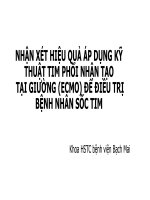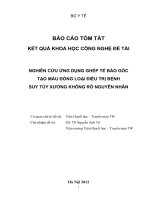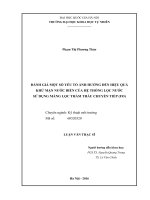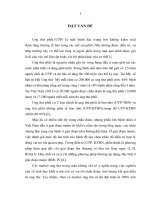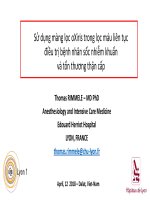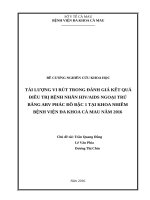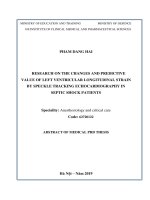Sử dụng màng lọc Oxiris trong lọc máu liên tục điều trị bệnh nhân sốc nhiễm khuẩn và tổn thương thận cấp
Bạn đang xem bản rút gọn của tài liệu. Xem và tải ngay bản đầy đủ của tài liệu tại đây (4.01 MB, 73 trang )
<span class='text_page_counter'>(1)</span><div class='page_container' data-page=1>
<b>Thomas RIMMELE – MD PhD</b>
<b>Anesthesiology and Intensive Care Medicine</b>
<b>Edouard Herriot Hospital</b>
<b>LYON, FRANCE</b>
<b></b>
Use of Oxiris during CVVH
in patients with septic shock and AKI
</div>
<span class='text_page_counter'>(2)</span><div class='page_container' data-page=2>
Conflicts of Interest
Scientific partnership with the following companies:
- Baxter
- Fresenius Medical Care
- Bbraun
- Nikkiso
</div>
<span class='text_page_counter'>(3)</span><div class='page_container' data-page=3>
OUTLINE
- Introduction
- Pathophysiology: how does blood purification work?
- Techniques for blood purification in 2018
</div>
<span class='text_page_counter'>(4)</span><div class='page_container' data-page=4>
OUTLINE
<b>- Introduction</b>
- Pathophysiology: how does blood purification work?
- Techniques for blood purification in 2018
</div>
<span class='text_page_counter'>(5)</span><div class='page_container' data-page=5>
<b>Hotchkiss et al. Nat Med 2009</b>
<b>TNF, IL-6, IL-8 (early deaths)</b>
<b>IL-4, IL-10, IL-1ra (late deaths) </b>
<b>- No clinical signs of this </b>
<b>immunosuppression</b>
<b>- Increased risk of HAI</b>
<b>- 70-80% of total mortality</b>
</div>
<span class='text_page_counter'>(6)</span><div class='page_container' data-page=6>
<b>Singer et al. JAMA 2016 </b>
</div>
<span class='text_page_counter'>(7)</span><div class='page_container' data-page=7>
<b>Singer et al. JAMA 2016 </b>
</div>
<span class='text_page_counter'>(8)</span><div class='page_container' data-page=8>
<b>Immunology</b>
</div>
<span class='text_page_counter'>(9)</span><div class='page_container' data-page=9></div>
<span class='text_page_counter'>(10)</span><div class='page_container' data-page=10>
<b>Initiation of a RRT session: 2 possible goals for the intensivist doctor </b>
AKI Sepsis-induced AKI Sepsis
RRT: Renal support Renal support Blood purification
+ Blood purification
1- Renal support for AKI
</div>
<span class='text_page_counter'>(11)</span><div class='page_container' data-page=11></div>
<span class='text_page_counter'>(12)</span><div class='page_container' data-page=12>
+ + +
+ + +
<b> </b>
<b> </b>
<b>-Ionic (or electrostatic) interactions</b>
<b>Van der Waals </b>
</div>
<span class='text_page_counter'>(13)</span><div class='page_container' data-page=13>
OUTLINE
- Introduction
<b>- Pathophysiology: how does blood purification work? </b>
- Techniques for blood purification in 2018
</div>
<span class='text_page_counter'>(14)</span><div class='page_container' data-page=14></div>
<span class='text_page_counter'>(15)</span><div class='page_container' data-page=15>
<b>Endotoxin </b>
</div>
<span class='text_page_counter'>(16)</span><div class='page_container' data-page=16></div>
<span class='text_page_counter'>(17)</span><div class='page_container' data-page=17></div>
<span class='text_page_counter'>(18)</span><div class='page_container' data-page=18>
- Interaction sorbent-leucocyte leading to a modification of expression
of leucocyte surface markers (ex: HLA-DR increase)
- Removal by adsorption of activated leucocytes
<b>Rimmelé et al. Crit Care 2013</b>
</div>
<span class='text_page_counter'>(19)</span><div class='page_container' data-page=19>
<b>Electronic microscopy and immunofluorescence pictures showing leucocytes adsorption on adsorptive polymer </b>
</div>
<span class='text_page_counter'>(20)</span><div class='page_container' data-page=20></div>
<span class='text_page_counter'>(21)</span><div class='page_container' data-page=21>
OUTLINE
- Introduction
- Pathophysiology: how does blood purification work?
<b>- Techniques for blood purification in 2018 </b>
</div>
<span class='text_page_counter'>(22)</span><div class='page_container' data-page=22>
• High-volume hemofiltration
• Cascade hemofiltration
• Plasma exchanges
• Coupled Plasma Filtration Adsorption
• Hemoperfusion
• New membranes (high adsorptive hemofiltration and high cut-off membranes)
</div>
<span class='text_page_counter'>(23)</span><div class='page_container' data-page=23>
• High-volume hemofiltration
• Cascade hemofiltration
• Plasma exchanges
• Coupled Plasma Filtration Adsorption
<b>• Hemoperfusion</b>
• New membranes (high adsorptive hemofiltration and high cut-off membranes)
</div>
<span class='text_page_counter'>(24)</span><div class='page_container' data-page=24>
Hemoperfusion devices
<b>Device</b> <b>Company</b> <b>Composition</b> <b>Substance eliminated</b>
PMX Toray, Japan PMX covalently bound to
polypropylene-polystyrene fiber Endotoxin
HA330 Jafron, China Neutral resin <sub>Cytokines</sub>
MG350 Biosun, China Neutral resin <sub>Cytokines</sub>
Cytosorb Cytosorbents, USA Polystyrenedivinyl benzene copolymer
beads with biocompatible
polyvinylpyrrolidone coating
Cytokines
LPS adsorber Alteco, Sweden Synthetic polypeptide bound to porous
</div>
<span class='text_page_counter'>(25)</span><div class='page_container' data-page=25></div>
<span class='text_page_counter'>(26)</span><div class='page_container' data-page=26></div>
<span class='text_page_counter'>(27)</span><div class='page_container' data-page=27>
<b>EUPHAS study </b>
<b>Cruz et al. JAMA 2009</b>
- Multicenter RCT performed in 10 Italian ICUs from 2004 to 2007
- 64 patients in septic shock, randomized in 2 groups:
- Conventional treatment
</div>
<span class='text_page_counter'>(28)</span><div class='page_container' data-page=28>
<i><b>Effects of </b></i>
<i><b>Hemoperfusion with a </b></i>
<i><b>Polymyxin B Membrane </b></i>
<i><b>in Peritonitis with </b></i>
<i><b>Septic shock</b></i>
<b>Dieppe</b>
<b>La Roche </b>
<b>sur Yon</b>
<b>LensLille</b>
<b>Limoges</b> <b></b>
<b>Clemont-Ferrand</b>
<b>Roanne</b>
<b>Paris</b>
<b>Rennes</b>
<b>Saint-Malo</b> <b>Strasbourg</b>
<b>Tours</b>
<b>Orleans</b>
<b>Bordeau</b>
<b>Poitiers</b>
<b>Rouen</b>
<b>Saint-Louis</b>
<b>Perpignan</b>
<b>PMX Trial in France </b>
<b>ABDO-MIX Study</b>
<b>Dr.Shoji</b>
</div>
<span class='text_page_counter'>(29)</span><div class='page_container' data-page=29></div>
<span class='text_page_counter'>(30)</span><div class='page_container' data-page=30>
Primary outcome: day 28 mortality
-PMX HP (n=119) = 27%
-Conventional treatment (n=113) = 19%
</div>
<span class='text_page_counter'>(31)</span><div class='page_container' data-page=31></div>
<span class='text_page_counter'>(32)</span><div class='page_container' data-page=32>
• High-volume hemofiltration
• Cascade hemofiltration
• Plasma exchanges
• Coupled Plasma Filtration Adsorption
• Hemoperfusion
<b>• New membranes (high adsorptive hemofiltration and « high cut-off » </b>
membranes)
</div>
<span class='text_page_counter'>(33)</span><div class='page_container' data-page=33>
<b>Oxiris®</b> <b>: pathophysiology</b>
</div>
<span class='text_page_counter'>(34)</span><div class='page_container' data-page=34></div>
<span class='text_page_counter'>(35)</span><div class='page_container' data-page=35>
Oxiris®
<b>CH<sub>2</sub></b>
<b>CH</b> <b>C</b>
<b>-CH<sub>2</sub></b>
<b>CH<sub>2</sub></b>
<b>CH<sub>3</sub></b>
<b>CN</b>
<b>SO<sub>3 </sub>Na</b>
</div>
<span class='text_page_counter'>(36)</span><div class='page_container' data-page=36>
- Oxiris®: Adsorption of negatively charged endotoxins on mb surface
</div>
<span class='text_page_counter'>(37)</span><div class='page_container' data-page=37>
<b>Oxiris</b>
<b>®</b><b>: animal data</b>
<i>- P. Aeruginosa porcine model of septic shock</i>
- 2 × 10 pigs : 6 h of HF with oxiris versus 6 h of HF with a standard mb
- Arterial and Swan-Ganz catheters to assess hemodynamics
</div>
<span class='text_page_counter'>(38)</span><div class='page_container' data-page=38></div>
<span class='text_page_counter'>(39)</span><div class='page_container' data-page=39></div>
<span class='text_page_counter'>(40)</span><div class='page_container' data-page=40></div>
<span class='text_page_counter'>(41)</span><div class='page_container' data-page=41>
N=10 rats per group
<b>Rimmelé, Peng, Kellum. unpublished data</b>
oxiris <b>®</b>
Hemoperfusion
</div>
<span class='text_page_counter'>(42)</span><div class='page_container' data-page=42>
<b>Shum et al. Hong Kong Med J 2013</b>
- Prospective case series study with historical controls
- From October 2011 to June 2012, 6 patients with sepsis-induced AKI due
to gram negative bacteria
- CVVH with Oxiris
</div>
<span class='text_page_counter'>(43)</span><div class='page_container' data-page=43></div>
<span class='text_page_counter'>(44)</span><div class='page_container' data-page=44>
The 3 main advantages of Oxiris
- <b>Hybrid therapy: RRT for AKI + blood purification for sepsis</b>
- <b>Targets endotoxins + cytokines </b>
</div>
<span class='text_page_counter'>(45)</span><div class='page_container' data-page=45>
OUTLINE
- Introduction
- Pathophysiology: how does blood purification work?
- Techniques for blood purification in 2017
</div>
<span class='text_page_counter'>(46)</span><div class='page_container' data-page=46></div>
<span class='text_page_counter'>(47)</span><div class='page_container' data-page=47>
How to answer this question?
Please, come on…There have been in the
past some promising experimental, animal
and clinical observational studies about
blood purification for sepsis. That’s right.
<b>BUT, all recent human RCTs are </b>
<b>negative !!!!</b>
</div>
<span class='text_page_counter'>(48)</span><div class='page_container' data-page=48>
How to answer this question?
Big NO !!!...
</div>
<span class='text_page_counter'>(49)</span><div class='page_container' data-page=49></div>
<span class='text_page_counter'>(50)</span><div class='page_container' data-page=50></div>
<span class='text_page_counter'>(51)</span><div class='page_container' data-page=51>
<b>EUPHAS study </b>
<b>Cruz et al. JAMA 2009</b>
- Multicenter RCT performed in 10 Italian ICUs from 2004 to 2007
- 64 patients in septic shock, randomized in 2 groups:
- Conventional treatment
</div>
<span class='text_page_counter'>(52)</span><div class='page_container' data-page=52>
<b>Livigni et al. BMJ Open 2014</b>
</div>
<span class='text_page_counter'>(53)</span><div class='page_container' data-page=53></div>
<span class='text_page_counter'>(54)</span><div class='page_container' data-page=54></div>
<span class='text_page_counter'>(55)</span><div class='page_container' data-page=55></div>
<span class='text_page_counter'>(56)</span><div class='page_container' data-page=56>
Any limits in these works?
IVOIRE
ABDOMIX
</div>
<span class='text_page_counter'>(57)</span><div class='page_container' data-page=57></div>
<span class='text_page_counter'>(58)</span><div class='page_container' data-page=58></div>
<span class='text_page_counter'>(59)</span><div class='page_container' data-page=59></div>
<span class='text_page_counter'>(60)</span><div class='page_container' data-page=60></div>
<span class='text_page_counter'>(61)</span><div class='page_container' data-page=61>
• High-volume hemofiltration
• Cascade hemofiltration
• Plasma exchanges
• Coupled Plasma Filtration Adsorption
<i><b>• Hemoperfusion outside PMX</b></i>
• New membranes
- high adsorptive hemofilters
- High cut-off membranes
<b>HAVE YOU NOTICED IN THE LITERATURE LARGE RCTs </b>
<b>ASSESSING THESE TECHNIQUES? </b>
</div>
<span class='text_page_counter'>(62)</span><div class='page_container' data-page=62>
Promotor: Hospices Civils de Lyon PI: Thomas Rimmelé
Multicenter (7 centers in France), interventional, Randomized Controlled Trial
Primary goal: to assess oXiris™ adsorption capacities (endotoxins, cytokines) in septic patients
Secondary goal: to assess oXiris™ effects on hemodynamics and survival in septic patients
Main criteria: Endotoxin and cytokine plasma levels
Secondary criteria: Cytokine levels in ultrafiltrate, Hemodynamic parameters, Patient survival
Patients: Septic shock patients with confirmed peritonitis
CVVH with citrate regional anticoagulation
Intervention group: oXiris™ filter
</div>
<span class='text_page_counter'>(63)</span><div class='page_container' data-page=63></div>
<span class='text_page_counter'>(64)</span><div class='page_container' data-page=64>
Negative large RCTs: importance of the studied population
Tested intervention
(Too?) large population
</div>
<span class='text_page_counter'>(65)</span><div class='page_container' data-page=65></div>
<span class='text_page_counter'>(66)</span><div class='page_container' data-page=66></div>
<span class='text_page_counter'>(67)</span><div class='page_container' data-page=67>
Past Future
<b>Technological progress</b>
<b>Medical knowledge</b>
<b>MANY UNANSWERED QUESTIONS : </b>
<b>Which patients exactly? </b>
<b>Which Timing? </b>
<b>How do these therapies exactly work? </b>
<b>What to ultimately remove?</b>
</div>
<span class='text_page_counter'>(68)</span><div class='page_container' data-page=68>
Futuristic technology?
</div>
<span class='text_page_counter'>(69)</span><div class='page_container' data-page=69></div>
<span class='text_page_counter'>(70)</span><div class='page_container' data-page=70>
<b>The Aethlon Hemopurifier®: Ongoing research from San Diego University, USA </b>
</div>
<span class='text_page_counter'>(71)</span><div class='page_container' data-page=71></div>
<span class='text_page_counter'>(72)</span><div class='page_container' data-page=72>
<b>IN THE FUTURE, we should find out what is best to remove in </b>
order to modulate the host immuno-inflammatory response!
</div>
<span class='text_page_counter'>(73)</span><div class='page_container' data-page=73>
<b>1)</b> <b>Sepsis = frequent, poor prognosis, expensive</b>
<b>2)</b> <b>2017: Immunology is now part of the sepsis definition!</b>
<b>3)</b> <b>Patients die of septic shock because of immununosuppression</b>
<b>4)</b> <b>Extracorporeal blood purification as an adjuvant treatment for sepsis? </b>
<b>several promising techniques such as OXIRIS under investigation</b>
<b>5)</b> <b>Multicenter RCTs = negative studies… but were they well-designed?</b>
<b>6)</b> <b>Many unanswered questions that should be addressed in the near future: </b>
<b>Which patients exactly? Which Timing? Which technique is best?</b>
<b>How do these therapies exactly work? Hybrid technique? Futuristic technique? </b>
<b>What to ultimately remove (cytokines, endotoxins, leukocytes, bacteria or viruses)?</b>
<b>7) Research in this field should definitely continue </b>
</div>
<!--links-->

